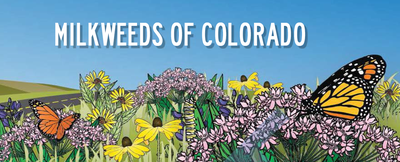Roadside Resiliency - Pollinator Program

Pollinator Habitat along Highway Corridors
Procedural Directive #503.1
Landscaping Requirements and Colorado Pollinator Highways directs CDOT and its consultants to specify Colorado native plants (grasses, perennials, biennials, and annuals) specific to the ecoregion for seed mixes in rights-of-way and unirrigated areas. The Procedural Directive allows for non-native plants only where irrigated, such as gateways, streetscapes, and facilities landscapes. CDOT highly encourages the use of water-wise plantings in these areas. CDOT is working to enhance and protect pollinator habitat along state highway corridors through its Integrated Roadside Vegetation Management Program.
The importance of this Procedural Directive is using native plants that promote habitat to our native pollinators. Our state highways are important corridors that connect to higher quality habitats and may be the only food source or cover for pollinators and other wildlife. It is important to add pollinator species to seed mixes per the Procedural Directive to meet CDOT’s agreement with the U.S. Fish and Wildlife Service for mitigation for the monarch butterfly. In addition, CDOT is continuing to work to enhance and protect pollinator habitat along state highway corridors through its Integrated Roadside Vegetation Management Program, and this Procedural Directive recognizes CDOT's Division of Maintenance and Operations as a partner.
CDOT is committed to preserving, enhancing, and creating pollinator habitat along Colorado highways. The Colorado State Legislature established Interstate Highway 76 (I-76) as the "Colorado Pollinator Highway" (House Joint Resolution 17-1029: Concerning the Designation of Interstate Highway 76 (I-76) as the “Colorado Pollinator Highway"). The CDOT Landscape Architecture Section is proud to lead in this collaborative effort with several local, state, and national organizations, including members of the Colorado Pollinator Network.
Other state and federal agencies have also provided guidance and resources in this effort. The Federal Highway Administration has written the guide Roadside Best Management Practices that Benefit Pollinators – A Handbook for Supporting Pollinators through Roadside Maintenance and Landscape Design. This landmark publication was written in response to Presidential Memorandum Creating a Federal Strategy to Promote the Health of Honey Bees and Other Pollinators.
Pollinator Resources: How You Can Get Involved
Colorado Pollinator Network
Colorado Pollinator Network (CPN) is a collaboration between organizations working together to conserve, protect, and create pollinator habitat and to educate communities across Colorado to protect our pollinators. We share best practices, research, resources and knowledge to support this mission. Our vision is for CPN to make Colorado a model state for collaboration on the protection of pollinators.
People and Pollinators
The People & Pollinators Action Network (PPAN) was born in late 2014 from the modest aim of public policy reform addressing the misapplication of pesticides. In the last three years their efforts have yielded new protections for Colorado’s pollinators and important lessons that will help shape our strategy in the future.
Xerces Society
The Xerces Society for Invertebrate Conservation is an international nonprofit organization that protects wildlife through the conservation of invertebrates and their habitats. The name is taken from the now extinct Xerces Blue butterfly (Glaucopsyche xerces), the first butterfly known to go extinct in North America as a result of human activities. Programs focus on habitat conservation and restoration, species conservation, protecting pollinators, contributing to watershed health, and reducing harm to invertebrates from pesticide use.
Pheasants Forever
Pheasants Forever is dedicated to the conservation of pheasants, quail and other wildlife through habitat improvements, public awareness, education, and land management policies and programs which influence quality and quantity of upland habitat—which also supports pollinator species. Since forming in 1982, Pheasants Forever has created or enhanced wildlife habitat on more than 15.8 million acres across the US and Canada. With a network of more than 700 chapters and 149,000 members, they accomplish thousands of wildlife habitat projects annually.
